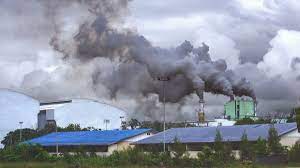African nations are seeking solutions to the issue at U.N. climate negotiations presently taking place in Egypt. They want to raise the amount of money they receive from programs that offset greenhouse gas emissions.
The cost of carbon offsets, which allow polluters to essentially cancel out their emissions by contributing to projects like tree planting, is now lower in Africa than in many other regions of the world where the programs are subject to stricter regulations. African countries are looking to climate talks to help them achieve their own emission reduction goals and move toward clean energy by securing a better price on the “carbon market.” Environmental organizations are concerned that the plans are a license to continue polluting and have called the schemes into question.
Collins Nzovu, the environment minister for Zambia, told reporters that “we should look at carbon trading as an income instrument for our developmental agenda. If we hurry into this market, we may lose our national heritage and give it at a low price that we would regret in the future.”
For the purposes of carbon trading, each credit awarded corresponds to one ton of carbon dioxide or another greenhouse gas removed from the atmosphere. Integrity and transparency issues have hampered the voluntary carbon market, which continues to dominate across Africa. Africa presently earns less than $10 a tonne of carbon according to the market. In other cases, other areas can secure more than $100 for the same amount.
However, carbon credit programs have had some success in Kenya, Tanzania, and Congo.
For instance, the Ntakata Mountains Project in Tanzania has given local communities additional money to invest in infrastructure, community clinics, and schools. Other projects spread out over the continent, including Kenya’s Mikoko Pamoja project, have achieved similar success.
However, there are still initiatives to increase industry regulation, particularly in Africa.
According to Antonio Pedro, executive secretary of the U.N. Economic Commission for Africa, “high-integrity carbon registries, which sustain a supply of high-quality and reliable credits that are tradable in the global exchange markets, are critical and will allow African countries to succeed in those processes.”
In order to control markets, Pedro continued, there must be major assistance from wealthy nations, where there will be a need for such high-quality carbon credits. However, there would need for restrictions on how businesses can use carbon credits in order to prevent the market from driving emissions even higher.
John Kerry, the U.S. representative on climate change, unveiled a contentious plan on Wednesday to encourage large corporations to participate in carbon markets, raising concerns from environmental organizations that it would allow businesses to continue emitting at higher rates. Kerry insisted that there would be numerous “guardrails against abuse” and that the credits would be “highly regulated,” including who can purchase them and how they can be used.
According to research presented at the U.N. summit on Saturday by the Africa Climate Policy Centre, if the cost of a carbon credit is set at $120 per ton of carbon, the continent has a chance of keeping global warming within the parameters of the Paris Agreement. According to the study, that would bring in nearly $82 billion annually.
According to experts, carbon markets need to be credible in order to be effective at reducing global warming.
“Carbon markets need to be protected while maintaining their integrity because they benefit both investors and communities.” In the past, there have been negative incidents. Integrity in carbon markets is crucial, according to Pedro.




















